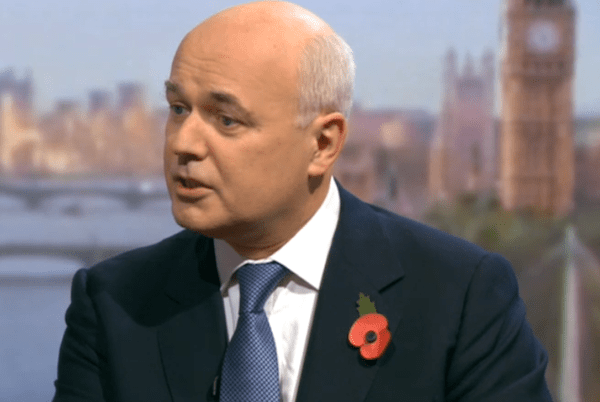Iain Duncan Smith was strangely vague this morning when Andrew Marr asked him whether he thought Britain could survive outside the European Union. He said:
‘I’m an optimist about the UK. I’ve always been involved with our trade with our European partners which we will always be doing whatever this relationship is, and the Prime minister will talk about that in the future… We’re a member of the European Union, that gives us benefits but we have to figure out where that’s going. But in the world we are a global trader already, we’re more of a global trader than any other country in Europe. So I hate this argument that says, you know little Britain outside, or… We can both be within our trading relationships within Europe, we can also be a fantastic global trader.’
All eyes were on the Work and Pensions Secretary after reports in the Mail on Sunday this morning that a Cabinet minister had considered resigning to join Wednesday’s rebellion on the EU budget. But he made clear that he supported the Prime Minister, saying ‘I think he would love to come back with a real terms cut’, adding that ‘we don’t give enough credit to him’ for his veto last winter.
Pressed by Marr on whether he believed that Britain would flourish if it did leave the EU, Duncan Smith said:
‘My view isn’t that we could do necessarily outside the EU better than we do in inside it, it’s that we can do it all, I don’t see why we shouldn’t have it all.’
As James reports in his column today, the Prime Minister is set to give a speech setting out whether he too thinks Britain can ‘have it all’, in the words of his colleague. Those pushing for a referendum on Britain’s relationship with the European Union hope this will be the time he will set out the party’s position on that plebiscite. Leading eurosceptic Bernard Jenkin has an angry piece on ConHome today in which he argues that a 2015 commitment to renegotiate backed with a referendum would be ‘pretty hopeless’ because the new shape of the EU could well be settled by then. He adds:
‘A positive future for the UK as a member of the EU requires a far more radical change than nibbling at “competences”. The PM should set out, in positive and cooperative terms, that the UK must maintain a single market with the EU (including a single customs union), but only if we can take back control over our own laws and legal system. The rules of the single market should be agreed, not imposed.’
Moreover, the pressure is on from the Tory backbenches to offer a straightforward In/Out referendum, and this is backed up by polling data released today by the People’s Pledge, which shows that 53 per cent of Conservative voters in Corby – which heads to the polls to elect a replacement for Louise Mensch on 15 November – do not think there is any point in a referendum which does not include an in/out option. If no referendum is offered at all in 2015, 37 per cent of Conservative supporters would ‘seriously consider’ voting for someone else.
The ComRes poll in Corby, Witney and Doncaster North found 61 per cent of Conservative voters were ‘dissatisfied’ with Britain’s current relationship with Europe, and 68 per cent of Tory voters in those three constituencies want a referendum. But worryingly for Cameron, 57 per cent of voters don’t believe he would hold a referendum if he won the next general election, and the figures aren’t much better for those already inclined to support his party, with 51 per cent of Conservative voters saying it is unlikely he would hold a referendum.
One backbencher I spoke to this week said the party was desperate for that referendum pledge in the forthcoming big speech by the Prime Minister. If there wasn’t, he said, there would be uproar. But what would happen next? I asked. He paused for a moment, and then said he wasn’t sure, because there was no obvious alternative to Cameron. The party would probably continue as it was until 2015, but with a group of backbenchers demoralised and without hope that they would secure a majority. It was a gloomy verdict, and shows the pressure the Prime Minister is under to deliver in his much-vaunted speech.







Comments